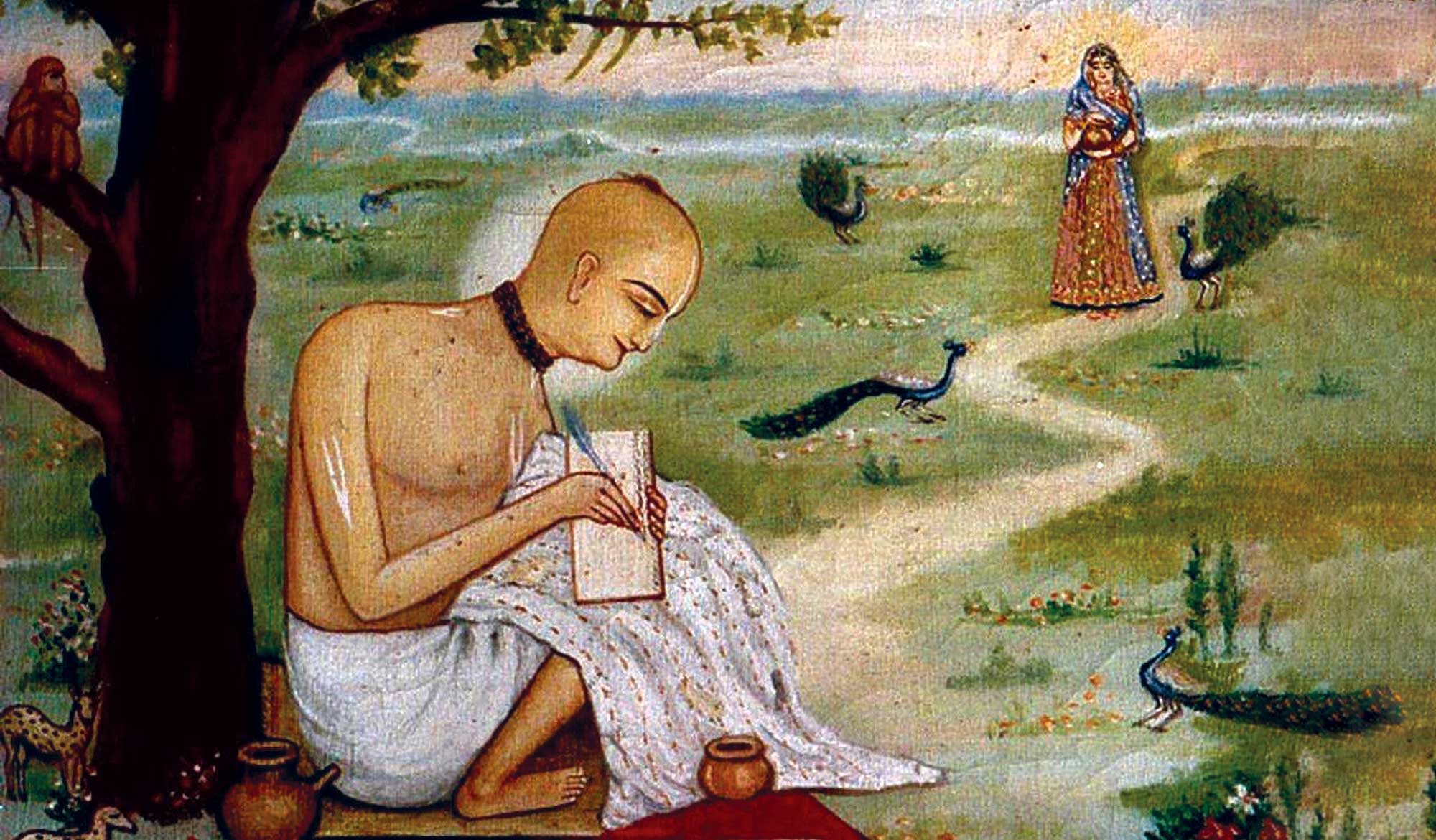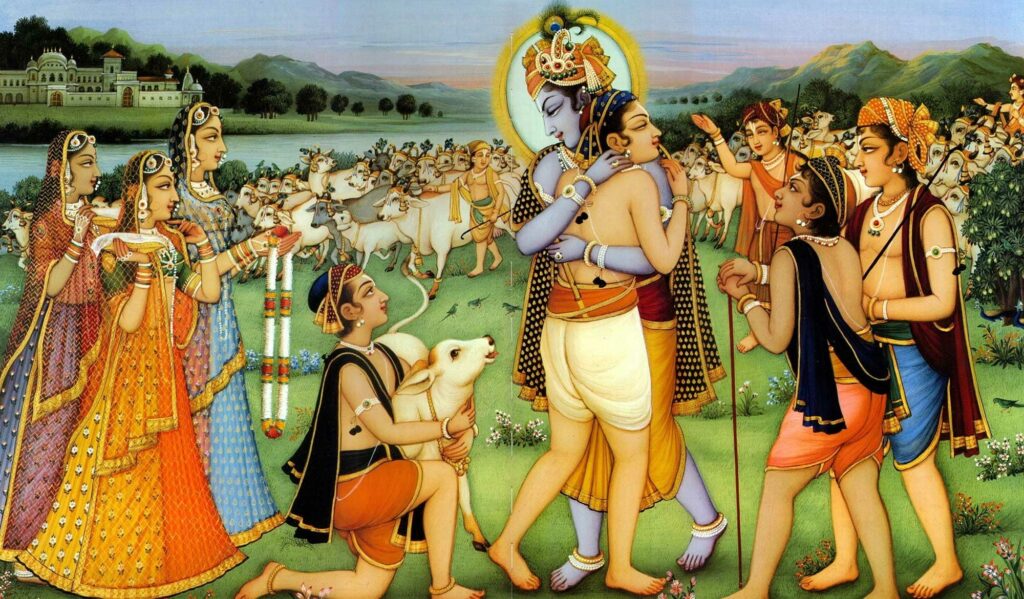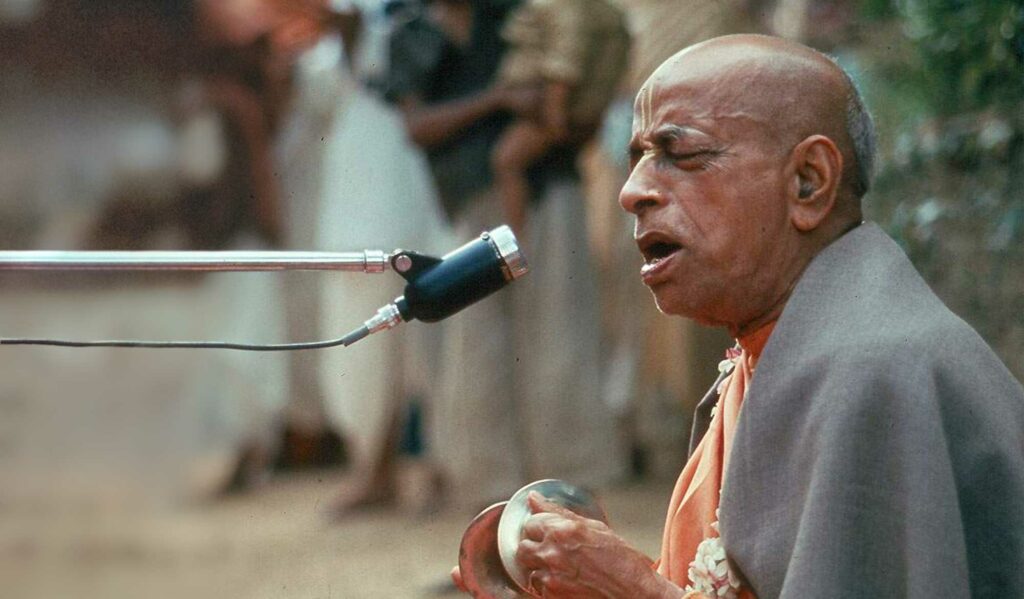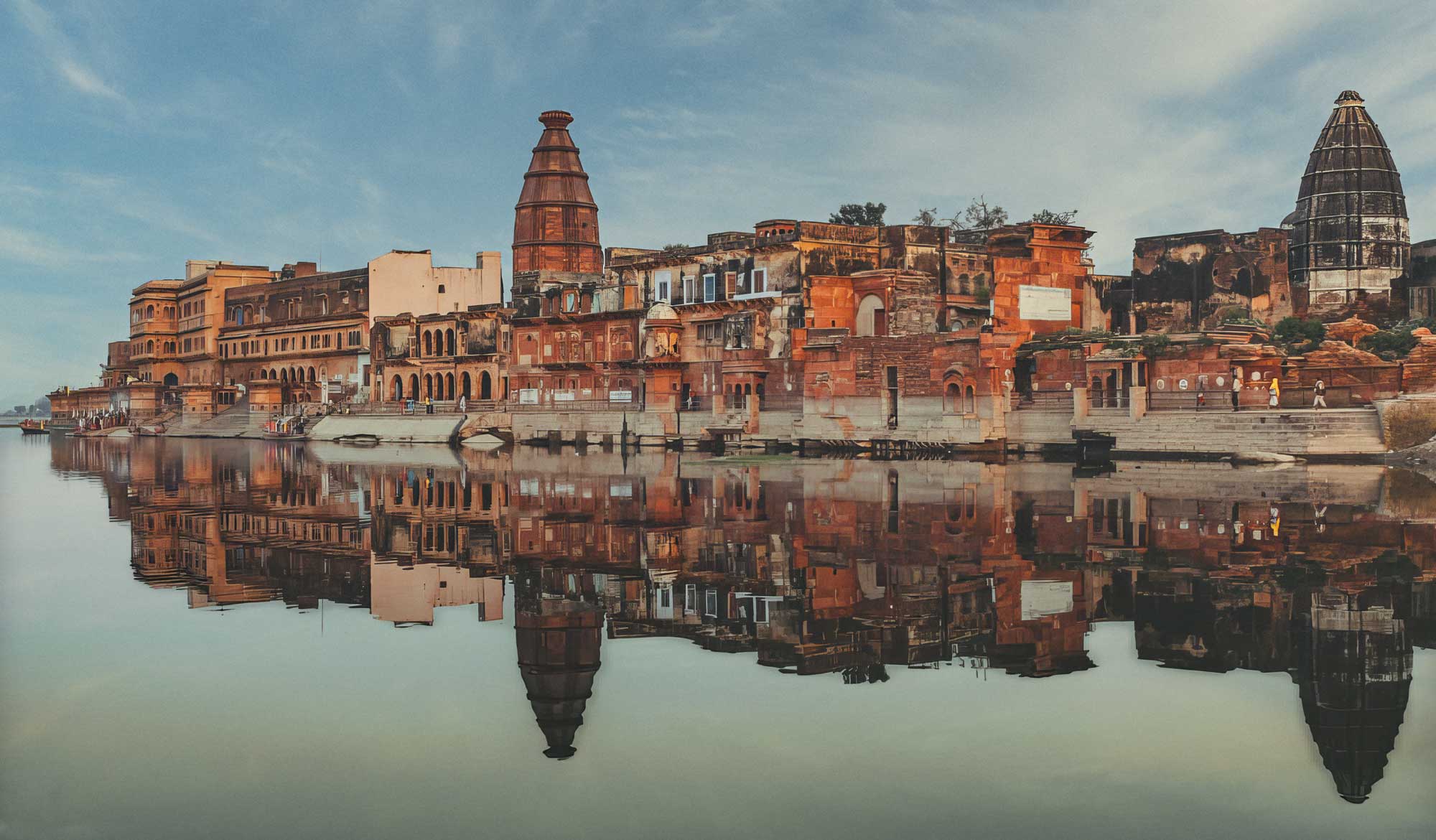Overview
With the forthcoming observance of Śrīla Rūpa Gosvāmi’s disappearance, we present ‘Śrīmad Rūpa Pada Rajaḥ Prārthanā Daśakam’ (Ten Prayers to the Foot-Dust of Śrīmad Rūpa Gosvāmī), a Sanskrit composition by Śrīla Śrīdhara Deva Gosvāmī Mahārāja. first published in Śrī Gauḍīya Darśana magazine, Vol.11, Issue 1 in 1965.
(1)
śrīmac-caitanya-pādau cara-kamala-yugau netra-bhṛṅgau madhu dyau
gauḍe tau pāyayantau vraja-vipina-gatau vyāja-yuktau samutkau
bhātau sa-bhrātṛkasya svajana-gaṇa-pater yasya saubhāgya-bhūmnaḥ
sa śrī-rūpaḥ kadā māṁ nija-pada-rajasā bhūṣitaṁ samvidhatte
śrīmac-caitanya – Śrī Caitanya; pādau – feet; cara – moving; kamala – lotus; yugau – both; netra – eyes; bhṛṅgau – bumblebees; madhu – nectar; dyau – divine; gauḍe – Bengal; tau – those; pāyayantau – drink; vraja-vipina – the forest of Vraja; gatau – go; vyāja – pretence; yuktau – with; samutkau – eager; bhātau – brilliant; sa – with; bhrātṛkasya – of his brothers; svajana-gaṇa – His associates; pateḥ – leader; yasya – whose; saubhāgya – fortune; bhūmnaḥ – exalted; sa – that; śrī-rūpaḥ – Śrī Rūpa Gosvāmī; kadā – when; māṁ – me; nija-pada – his own feet; rajasā – dust; bhūṣitaṁ – decorate; samvidhatte – give.
Śrī Caitanya’s lotus feet moved through Bengal on the pretext of travelling to the forests of Vraja, and His restless eyes were like bumblebees eagerly drinking divine nectar. At that time, He met the most fortunate and venerable Śrī Rūpa Gosvāmī, who was radiant in the association of his brothers and is the leader amongst the Lord’s associates. When will that Śrī Rūpa decorate me with the dust of his feet?
(2)
pīta-śrī-gaura-pādāmbuja-madhu-madironmatta-hṛd-bhṛṅga-rājo
rājyaiśvaryaṁ jahau yo jana-nivaha-hitādatta-citto-nijāgryam
vijñāpya svānujena vraja-gamana-rataṁ cānvagāt gaura-candraṁ
sa śrī-rūpaḥ kadā māṁ nija-pada-rajasā bhūṣitaṁ samvidhatte
rājya – royal; aiśvarya – opulence; jahau – relinquish; yo – he who; jana – people; nivaha – all; hita – welfare; adatta – accepted; citta – conception; nija – own; agryam – most excellent; vijñāpya – inform; sva-anujena – by his elder brother; vraja – Vraja-dhāma; gamana – go; rata – absorbed; ca – and; anvagāt – follow; gaura-candra – Śrī Gaura-candra; sa – that; śrī-rūpaḥ – Śrī Rūpa Gosvāmī; kadā – when; māṁ – me; nija-pada – his own feet; rajasā – dust; bhūṣitaṁ – decorate; samvidhatte – give.
The heart of Śrī Rūpa was like the king of bees which became intoxicated in drinking the nectarean wine of the lotus feet of Śrī Gaura. He relinquished royal opulence for the welfare of all people, and accepted the Lord’s most exalted philosophy. Informing his elder brother (Sanātana Gosvāmī), he followed Śrī Gaura-candra who was absorbed in thoughts of going to Vraja. When will that Śrī Rūpa decorate me with the dust of his feet?
(3)
vṛndāraṇyāt prayāge hari-rasa-naṭanair nāma-saṅkīrtanaiś ca
lebhe yo mādhavāgre jana-gahana-gataṁ prema-mattaṁ janāṁś ca
bhāvaiḥ svair mādayantaṁ hṛta-nidhir iva taṁ kṛṣṇa-caitanya-candraṁ
sa śrī-rūpaḥ kadā māṁ nija-pada-rajasā bhūṣitaṁ samvidhatte
vṛndāraṇyāt – from Vṛndāvana; prayāge – in Prayāga; hari-rasa – mellows of Hari; naṭanair – with dancing; nāma-saṅkīrtanaiḥ – by the congregational chanting of the Holy Names; ca – and; lebhe – achieved; yaḥ – who; mādhava – Bindu Mādhava; agre – in front of; jana – people; gahana – crowds; gataṁ – surrounded; prema – divine love; mattaṁ – intoxicated; janāṁś – residents; ca – and; bhāvaiḥ – divine sentiments; svair – own; māda – intoxicated; ayantaṁ – came; hṛta – heart; nidhir – ocean; iva – as; taṁ – unto him; kṛṣṇa caitanya-candraṁ – the moon-like Kṛṣṇa Caitanya; sa – that; śrī-rūpaḥ – Śrī Rūpa Gosvāmī; kadā – when; māṁ – me; nija-pada – his own feet; rajasā – dust; bhūṣitaṁ – decorate; samvidhatte – give.
Returning from Vṛndāvana, Mahāprabhu came to Prayaga and, absorbed in the mellows of Hari, engaged in nāma-saṅkīrtana. Śrī Rūpa saw the Lord in front of Bindu Mādhava, surrounded by crowds of people and thus the residents of Prayāga became intoxicated with prema. Śrī Kṛṣṇa Caitanya-candra’s own divine sentiments came and flooded his heart like an ocean. When will that Śrī Rūpa decorate me with the dust of his feet?
(4)
ekantaṁ labdha-pādāmbuja-nija-hṛdaya-preṣṭha-pātro mahārtir
dainyair-duḥkhāśru-pūrṇair daśana-dhṛta-tṛṇaiḥ pūjayāmāsa gauram
svāntaḥ kṛṣṇañca gaṅgā-dinamaṇi-tanayā-saṅgame sānujo yaḥ
sa śrī-rūpaḥ kadā māṁ nija-pada-rajasā bhūṣitaṁ samvidhatte
ekantaṁ – exclusive devotion; labdha – attain; pāda-ambuja – lotus feet; nija – own; hṛdaya – heart; preṣṭha – greatest; pātra – receptacle; mahā-arti – great distress; dainyaih – humility; duḥkha – sadness; aśru – tears; pūrṇaiḥ – full; daśana – teeth; dhṛta – clutching; tṛṇaiḥ – straw; pūjayāmāsa – worshipped; gauram – Śrī Gaura; svāntaḥ – within Him; kṛṣṇam – Śrī Kṛṣṇa; ca – and; gaṅgā – the Gaṅgā; dinamaṇi-tanayā – the Yamunā, the daughter of the sun; saṅgame – at the confluence; sa – with; anuja – younger brother; yaḥ – who; sa – that; śrī-rūpaḥ – Śrī Rūpa Gosvāmī; kadā – when; māṁ – me; nija-pada – his own feet; rajasā – dust; bhūṣitaṁ – decorate; samvidhatte – give.
At the confluence of the Gaṅgā and the Yamunā, Śrī Rūpa and his younger brother Anupama, feeling much distress, humility and sadness, with their eyes full of tears and a straw between their teeth, worshipped that Golden Lord who is Kṛṣṇa within. In this way, Śrī Rūpa attained exclusive devotion and his heart became the greatest receptacle for the Lord’s lotus feet. When will that Śrī Rūpa decorate me with the dust of his feet?
(5)
svasya prema-svarūpam priya-dayita-vilāsānurūpaika-rūpaṁ
dūre bhū-luṇṭhitaṁ yaṁ sahaja-sumadhura-śrīyutaṁ sānujañ ca
dṛṣṭvā devo’titūrnaṁ stuti-bahu-mukham āśliṣya gāḍham rarañje
sa śrī-rūpaḥ kadā māṁ nija-pada-rajasā bhūṣitaṁ samvidhatte
svasya – of His own; prema-svarūpam – the embodiment of prema; priya – dear; dayita – servant; vilāsa – pastimes; anurūpa – equal; aika-rūpaṁ – one form; dūre – at a distance; bhū – ground; luṇṭhitaṁ – roll; yaṁ – this; sahaja – natural; sumadhura – sweetness; śrīyutaṁ – endowed with greatness; sa – with; anujaṁ – younger brother; ca – and; dṛṣṭvā – seeing; deva – the Lord; atitūrnaṁ – quickly; stuti – praise; bahu-mukham – speaking in many ways; āśliṣya – embraced; gāḍham – with feeling; rarañje – in bliss; sa – that; śrī-rūpaḥ – Śrī Rūpa Gosvāmī; kadā – when; māṁ – me; nija-pada – his own feet; rajasā – dust; bhūṣitaṁ – decorate; samvidhatte – give.
Śrī Rūpa and his younger brother rolled on the ground at a distance. Seeing the embodiment of His own prema, His dear servant, who is like His own self in loving pastimes, endowed with natural sweetness, the Lord quickly came to him and, singing his glories in many ways, embraced him with great bliss. When will that Śrī Rūpa decorate me with the dust of his feet?
(6)
kaivalya-prema-bhūmāv-akhila-rasa-sudhā-sindhu-sañcāra-dakṣaṁ
jñatvāpy evañ ca rādhā-pada-bhajana-sudhaṁ līlayāpāyayad yam
śaktiṁ sañcārya gauro nija-bhajana-sudhā-dāna-dakṣaṁ cakāra
sa śrī-rūpaḥ kadā māṁ nija-pada-rajasā bhūṣitaṁ samvidhatte
kaivalya – exclusive; prema – divine love; bhūmau – land; akhila – all; rasa – devotional mellows; sudhā – nectar: sindhu – ocean: sañcāra – wander; dakṣaṁ – expert; jñatvā – knowing well: api – also; evaṁ – in this way; ca – and; rādhā – Śrī Rādhā; pada – feet; bhajana – worship; sudhaṁ – nectar; līlayā – pastimes; apāyayad – drink; yam – this; śaktiṁ – potency; sañcārya – empowered; gaura – Śrī Gaura; nija – own; bhajana – worship; sudhā – nectar; dāna – distribute; dakṣaṁ – expert; cakāra – execute; sa – that; śrī-rūpaḥ – Śrī Rūpa Gosvāmī; kadā – when; māṁ – me; nija-pada – his own feet; rajasā – dust; bhūṣitaṁ – decorate; samvidhatte – give.
The Lord was aware that Śrī Rūpa was proficient in wandering throughout the nectarean ocean of all kinds of mellows within the realm of exclusive prema. In this way, he drank the ambrosial worship of the divine feet of Śrī Rādhikā. Thus, Śrī Gaura empowered him with the potency to expertly distribute the nectar of His own worship (gaura-bhajana). When will that Śrī Rūpa decorate me with the dust of his feet?
(7)
gaurādeśāc ca vṛndā-vipinam iha parikramya nīlācalam yo
gatvā kāvyāmṛtaiḥ svair vraja-yuva-yugala-krīḍanārthaiḥ prakāmam
rāmānanda-svarūpadibhir api kavibhis tarpayāmāsa gauraṁ
sa śrī-rūpaḥ kadā māṁ nija-pada-rajasā bhūṣitaṁ samvidhatte
gaura – Śrī Gaura; adeśa – instruction; ca – and; vṛndā-vipinam – forest of Vṛndāvana; iha – in this; parikramya – circumambulation; nīlācalam – Jagannātha Purī; ya – which; gatvā – going; kāvya – poetry; amṛtaiḥ – nectar; svaiḥ – own; vraja – Vraja; yuva – youthful; yugala – Divine Couple; krīḍana – play; arthaiḥ – fulfil; prakāmam – desires; rāmānanda – Rāmānada Rāya; svarūpa – Svarūpa Dāmodara; adibhiḥ – others; api – even; kavibhiḥ – learned assembly; tarpayāmāsa – satisfied; gauraṁ – Śrī Gaura; sa – that; śrī-rūpaḥ – Śrī Rūpa Gosvāmī; kadā – when; māṁ – me; nija-pada – his own feet; rajasā – dust; bhūṣitaṁ – decorate; samvidhatte – give.
Upon the order of Lord Gaurāṅga, Śrī Rūpa travelled to Nīlācala (Jagannātha Purī) after circumambulating the forest of Vṛndāvana. His own nectarean poetry concerning the love-dalliances of the youthful Divine Couple fulfilled the desires of the Lord. He thus satisfied Śrī Gaura and the learned assembly of devotees headed by Rāmānanda Rāya and Svarūpa Dāmodara. When will that Śrī Rūpa decorate me with the dust of his feet?
(8)
līlā-saṁgopane śrī-bhagavata iha vai jaṅgame sthāvare ‘pi
saṁmugdhe sāgrajātaḥ prabhu-viraha-hṛta-prāya-jīvendriyāṇām
yaś cāsīd āśrayaika-sthalam iva raghu-gopāla-jīvādi-varge
sa śrī-rūpaḥ kadā māṁ nija-pada-rajasā bhūṣitaṁ samvidhatte
līlā – pastimes; saṁgopane – concealed; śrī-bhagavata – the Lord; iha – in this; vai – actually; jaṅgame – moving; sthāvare – immovable; api – even; saṁmugdhe – mortified; sa – with; agrajātaḥ – elder brother; prabhu – the Lord; viraha – separation; hṛta – deprived; prāya – almost; jīva-indriyāṇām – life and senses; yaḥ – who; ca – and; asīd – became; āśraya – shelter; eka – only; sthalam – place; iva – as; raghu – Raghunātha Dāsa Gosvāmī; gopāla – Gopāla Bhaṭṭa Gosvāmī; jīva – Jīva Gosvāmī; adi – and others; varge – assembly; sa – that; śrī-rūpaḥ – Śrī Rūpa Gosvāmī; kadā – when; māṁ – me; nija-pada – his own feet; rajasā – dust; bhūṣitaṁ – decorate; samvidhatte – give.
When the Lord’s pastimes became concealed, both moving and non-moving living beings became perturbed. Śrī Rūpa and his elder brother were almost deprived of their lives and senses due to separation from the Lord. They became the only place of refuge for devotees such as Raghunātha Dāsa, Gopāla Bhaṭṭa and Śrī Jīva. When will that Śrī Rūpa decorate me with the dust of his feet?
(9)
śrī-mūrteḥ sādhu-vṛtteḥ prakaṭanam api tal-lupta-tīrthādikānāṁ
śrī-rādhā-kṛṣṇa-pādāmbuja-bhajanamayaṁ rāga-mārgaṁ viśuddham
granthair yena pradattaṁ nikhilam iha nijābhīṣṭa-devepsitañ ca
sa śrī-rūpaḥ kadā māṁ nija-pada-rajasā bhūṣitaṁ samvidhatte
śrī-mūrteḥ – the Deity; sādhu-vṛtteḥ – the conduct of devotees; prakaṭanam – reveal; api – also; tat – those; lupta – hidden; tīrthādikānāṁ – holy places; śrī-rādhā-kṛṣṇa – Rādhā-Kṛṣṇa; pāda-ambuja – lotus feet; bhajana-mayaṁ – complete worship; rāga-mārgaṁ – the path of spontaneous divine love; viśuddham – transcendental; granthaiḥ – literature; yena – by which; pradattaṁ – give; nikhilam – all; iha – in the world; nija – own; abhīṣṭa – cherished; deva – the Lord; ipsitam – desire; ca – and; sa – that; śrī-rūpaḥ – Śrī Rūpa Gosvāmī; kadā – when; māṁ – me; nija-pada – his own feet; rajasā – dust; bhūṣitaṁ – decorate; samvidhatte – give.
By contributing transcendental literature, Śrī Rūpa communicated the most cherished desires of the Lord to the world – revealing service of the Deity, the proper conduct for devotees, discovering the lost holy places, and establishing rāga-mārga (the path of spontaneous divine love), the complete worship of the lotus feet of Śrī Śrī Rādhā and Kṛṣṇa. When will that Śrī Rūpa decorate me with the dust of his feet?
(10)
līlā-saṁgopa-kāle nirupadhi-karuṇā-kāriṇā svāmīnāhaṁ
yat pādābje ‘rpito yat pada-bhajanamayaṁ gāyayitvā tu gītam
yogyāyogyatva-bhāvām mama khalu sakalaṁ duṣṭa-buddher agṛhṇan
sa śrī-rūpaḥ kadā māṁ nija-pada-rajasā bhūṣitaṁ samvidhatte
līlā – pastimes; saṁgopa – withdrawing; kāle – time; nirupadhi – unconditional; karuṇā – merciful; kāriṇā – doing; svāmīn – master; āhaṁ – I; yat – which; pādābje – lotus feet; arpita – offer; yat – which; pada – feet; bhajanamayaṁ – exclusive worship; gāyayitvā – sing; tu – indeed; gītam –song; yogyāyogyatva – qualifications and disqualifications; bhāvām – considering; mama – my; khalu – nevertheless; sakalaṁ – all; duṣṭa – faulty; buddhi – intellect; agṛhṇan – without accepting; sa – that; śrī-rūpaḥ – Śrī Rūpa Gosvāmī; kadā – when; māṁ – me; nija-pada – his own feet; rajasā – dust; bhūṣitaṁ – decorate; samvidhatte – give.
At the time of withdrawing his līlā, my unconditionally merciful master (Śrīla Bhaktisiddhānta Sarasvatī Ṭhākura) offered me unto the lotus feet of Śrī Rūpa by having me sing a song (Śrī Rūpa Mañjarī Pada) concerning exclusive service to his feet. Despite my possessing faulty intellect, when will that Śrī Rūpa decorate me with the dust of his feet, disregarding all my qualifications and disqualifications?
Read or Listen to Śrīla Śrīdhara Mahārāja’s Illuminations on Rūpa Gosvāmī’s Upadeśāmṛta
Related Articles, Songs and Prayers
- Śrī Gaura-hari Kusuma Stavāṣṭākam by Śrīla Bhakti Rakṣaka Śrīdhara Deva Gosvāmī
- Śrī Kusumañjalī (An Offering of Flowers) by Śrīla Bhakti Rakṣaka Śrīdhara Deva Gosvāmī
- Śrī Nāma Māhātmya (The Glories of the Holy Name) by Śrīla Bhakti Rakṣaka Śrīdhara Deva Gosvāmī
- Śrī Nityānanda Dvādaśakam by Śrīla Bhakti Rakṣaka Śrīdhara Deva Gosvāmī
- Śrīmad Bhaktivinoda Viraha Daśakam by Śrīla Bhakti Rakṣaka Śrīdhara Deva Gosvāmī
- Śrī Śrī Gaurasundara Āvirbhava Vāsare by Śrīla Bhakti Rakṣaka Śrīdhara Deva Gosvāmī
- ‘The Best of Thieves’ – An Illumination by Śrīla Bhakti Rakṣaka Śrīdhara Deva Gosvāmī
- Mā Muñca Pañca-daśakam (Fifteen Verses Praying Not to be Abandoned) by Śrīla Śrīdhara Deva Gosvāmī Mahārāja
- Śrīla Sarasvatī Gosvāmyāṣṭakam by Śrīla Śrīdhara Deva Gosvāmī Mahārāja
- Vṛndāvane Bhajana (Worship in Vṛndāvana) by Śrīla A.C. Bhaktivedānta Swami Prabhupāda
- Vaiśiṣṭyāṣṭaka (Eight Stanzas of Significance) by Śrīla A.C. Bhaktivedānta Swami Prabhupāda
- Svasti No Gaura-vidhur Dadhātu (May the Moon-like Gaura Bestow Auspiciousness) by Śrīla B.P. Purī Mahārāja
- A Prayer Composed on the Occasion of the Disappearance of Śrīla Gadādhara Paṇḍita by Śrīla Bhakti Pramoda Purī Gosvāmī
- Śrī Śrī Gaura Gopāla Praśasti (In Praise of Śrī Śrī Gaura Gopāla) by Śrīla Bhakti Pramoda Purī Gosvāmī
- Viraha-Gītikā (A Song of Separation) by Śrīla Bhakti Pramoda Purī Mahārāja
- Jaya Rādhā-Mādhava by Śrīla Bhakti Gaurava Narasiṅgha Mahārāja
- Purport to Śrīla Prabhupāda-līlā Smaraṇa-Maṅgala Stotram by Śrīla Bhakti Gaurava Narasiṅgha Mahārāja
- Purī Mahārāja’s Praṇāma Mantra by Śrīla Bhakti Gaurava Narasiṅgha Mahārāja
- Śrī Guru-viraha Ṣaṭakam – Six Verses in Separation from Śrī Guru by Swami B.V. Giri
- Śrī Guru Praṇāma Anuvākya – An Explanation of Śrīla Guru Mahārāja’s Praṇāma Mantra by Swami B.V. Giri
Further Reading from the Bhaktivinoda Institute
- Gītā-mālā (A Garland of Songs) by Śrīla Bhaktivinoda Ṭhākura (Songbook)
- Kalyāṇa Kalpataru (‘The auspicious Desire Tree’) by Śrīla Bhaktivinoda Ṭhākura (Songbook)
- Śaraṇāgati (Surrendered to the Lord’s Shelter) by Śrīla Bhaktivinoda Ṭhākura (Songbook)
- Gītāvalī (A Collection of Songs) by Śrīla Bhaktivinoda Ṭhākura (Songbook)
- Bāula Saṅgīta by Śrīla Bhaktivinoda Ṭhākura (Songbook)
- Sevā Lālasā (Hankering for Service) by Śrīla Bhaktivinoda Ṭhākura (Songbook)
- Śrī Godruma-candra Bhajanopadeśa by Śrīla Bhaktivinoda Ṭhākura
- Śrī Kṛṣṇacandra by Śrīla Bhaktivinoda Ṭhākura
- Śrī Gīta Govinda Introduction by Śrīla Bhaktivinoda Ṭhākura
- Poems by Śrīla Bhaktivinoda Ṭhākura
Pilgrimage with Swami Narasiṅgha – Part 7: Keśī Ghāṭa
Continuing with our pilgrimage series, this week Śrīla Narasiṅgha Mahārāja takes us to Keśī Ghāṭā where he tells us about Madhumaṅgala’s meeting with the Keśī demon, what Keśī represents, and how Śrīla Prabhupāda almost acquired Keśī Ghāṭa. Mahārāja also narrates his own experience. This article has been adapted from a number of talks and articles by Narasiṅgha Mahārāja.
Prema Dhāma Deva Stotram with the Narasiṅgha Sevaka Commentary – Verses 61-65
In verses 61 to 65 of 'Prema Dhāma Deva Stotram', Śrīla Śrīdhara Mahārāja narrates the pastime of Śrī Caitanya at Caṭaka Parvata In Purī and explains how the scriptures produced by Brahmā and Śiva are ultimately searching for the personality of Mahāprabhu who is merciful too all jīvas, no matter what their social position.
Prabhupāda Śrīla Sarasvatī Ṭhākura’s Visit to Ayodhyā
With the forthcoming observance of Śrī Rāma Navamī, we present 'Prabhupāda Śrīla Sarasvatī Ṭhākura’s Visit to Ayodhyā' written by Śrīla Bhaktisiddhānta Sarasvatī Ṭhākura Prabhupāda from The Gaudīyā magazine, Vol 3. Issue 21/ In December 1924, after visiting Benares and Prāyāga, Sarasvatī Ṭhākura visited the birth-site of Śrī Rāmācandra in Ayodhyā.
Śaraṇāgati – The Only Path to Auspiciousness
In this article, 'Śaraṇāgati - The Only Path to Auspiciousness', Dhīra Lalitā Dāsī analyses the process of śaraṇāgati (surrender) beginning with śraddhā (faith). She also discusses the role of śāstra and the Vaiṣṇava in connection with surrender.
Pilgrimage with Swami Narasiṅgha – Part 7: Keśī Ghāṭa
Continuing with our pilgrimage series, this week Śrīla Narasiṅgha Mahārāja takes us to Keśī Ghāṭā where he tells us about Madhumaṅgala’s meeting with the Keśī demon, what Keśī represents, and how Śrīla Prabhupāda almost acquired Keśī Ghāṭa. Mahārāja also narrates his own experience. This article has been adapted from a number of talks and articles by Narasiṅgha Mahārāja.
Prema Dhāma Deva Stotram with the Narasiṅgha Sevaka Commentary – Verses 61-65
In verses 61 to 65 of 'Prema Dhāma Deva Stotram', Śrīla Śrīdhara Mahārāja narrates the pastime of Śrī Caitanya at Caṭaka Parvata In Purī and explains how the scriptures produced by Brahmā and Śiva are ultimately searching for the personality of Mahāprabhu who is merciful too all jīvas, no matter what their social position.
Prabhupāda Śrīla Sarasvatī Ṭhākura’s Visit to Ayodhyā
With the forthcoming observance of Śrī Rāma Navamī, we present 'Prabhupāda Śrīla Sarasvatī Ṭhākura’s Visit to Ayodhyā' written by Śrīla Bhaktisiddhānta Sarasvatī Ṭhākura Prabhupāda from The Gaudīyā magazine, Vol 3. Issue 21/ In December 1924, after visiting Benares and Prāyāga, Sarasvatī Ṭhākura visited the birth-site of Śrī Rāmācandra in Ayodhyā.
Śaraṇāgati – The Only Path to Auspiciousness
In this article, 'Śaraṇāgati - The Only Path to Auspiciousness', Dhīra Lalitā Dāsī analyses the process of śaraṇāgati (surrender) beginning with śraddhā (faith). She also discusses the role of śāstra and the Vaiṣṇava in connection with surrender.








